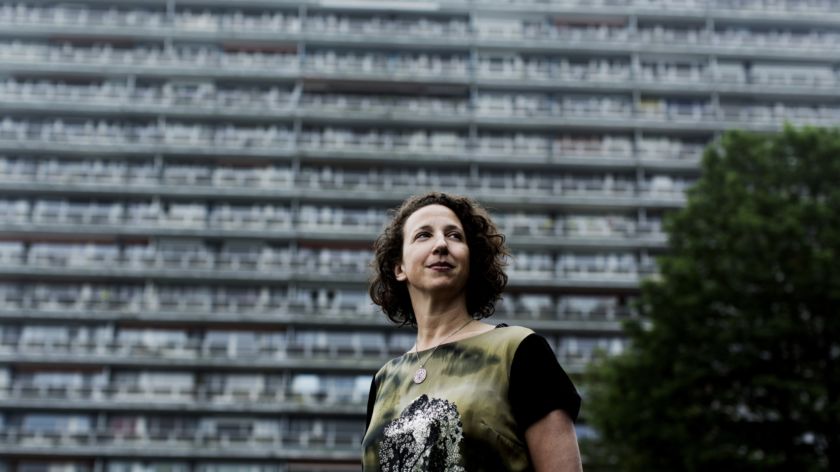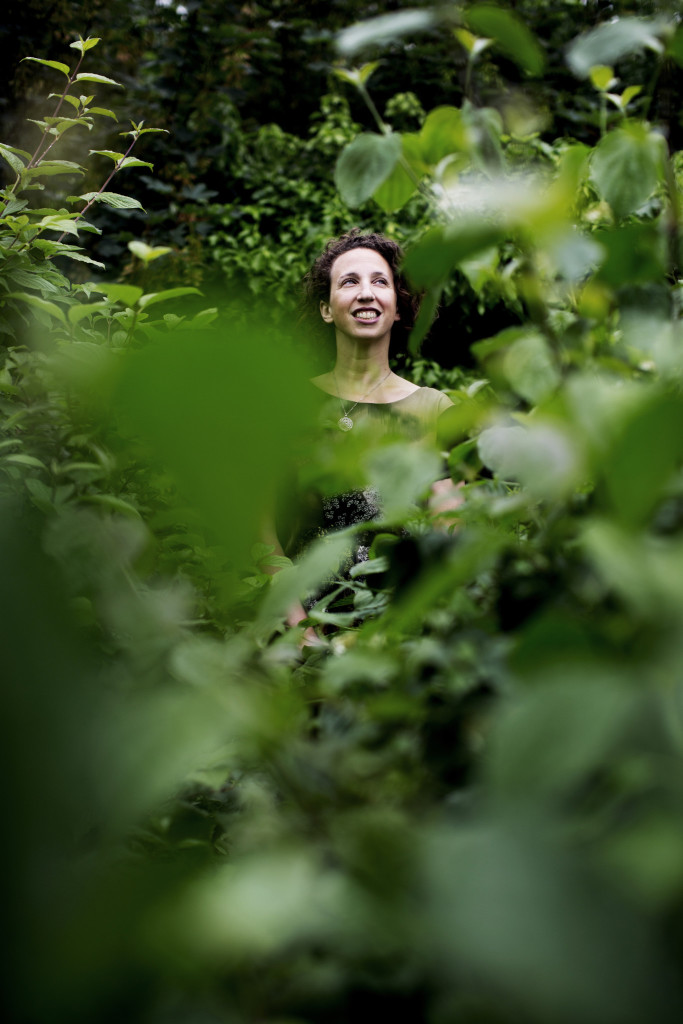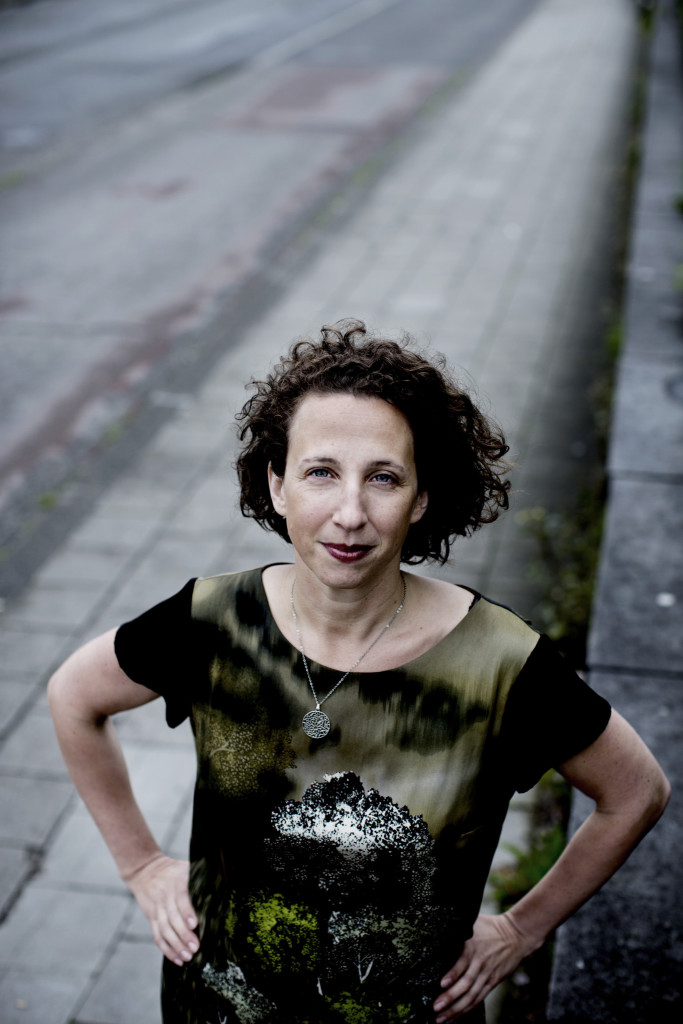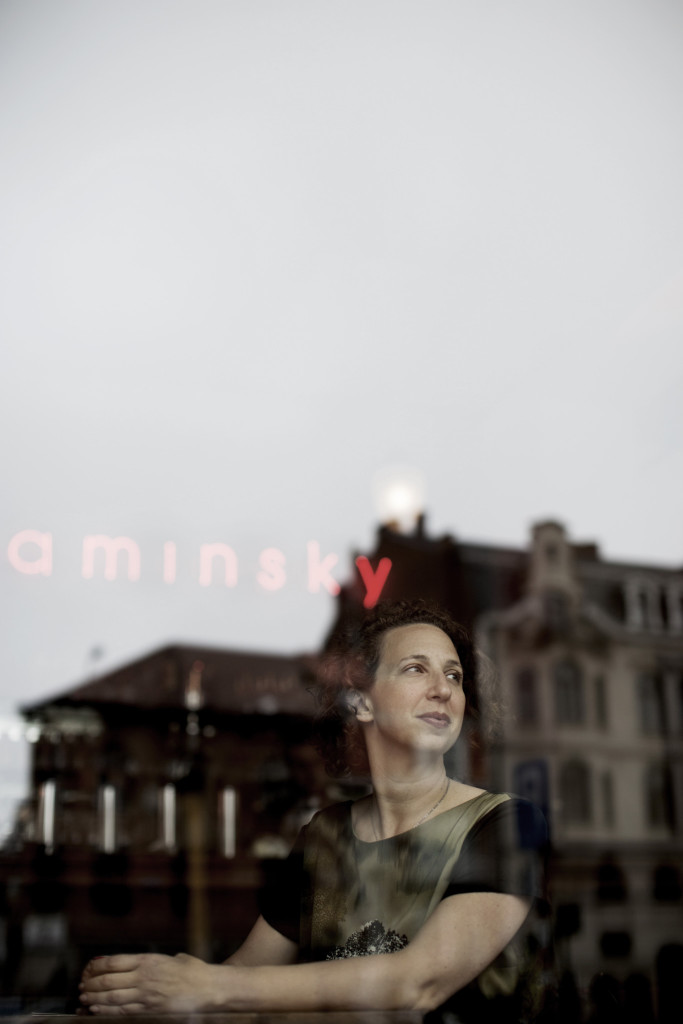Summer interview (5): Anya Topolski
-
 Photos: Duncan de Fey
Photos: Duncan de Fey
She is against Zwarte Piet and battles sexism in the academic world. While her parents were anxious to keep their Jewishness a secret, she lives her religion out in the open. Canadian political philosopher and Radboud lecturer Anya Topolski (39) from Leuven stands up against any form of exclusion. With hate mail as the result.
Hers is the only one in the row of Leuven houses with a flower box in front. On the front door a sticker: ‘Zwarte Piet is racism.’
Anya Topolski opens the door in her socks. Lightly, she steps away towards the kitchen. Graceful as a dancer. Me: ‘‘Zwarte Piet is racism’ it says on your door. You invite your visitors to start a discussion right away…’ Topolski: ‘A Flemish person would not dare to start such a conversation.’
‘They wouldn’t?’
‘The Dutch are more direct.’
Topolski is also more direct. She comes from Canada. She has Polish parents and is Jewish. And she wears her heart on her sleeve. She talks about things. For example in the schoolyard, around Sinterklaas time, when she tells a Belgian mother that Zwarte Piet is racism. Look at all these children with their blacked-up faces. This immediately provokes a fight. ‘Are you accusing me of racism?’ shouts the mother. Topolski: ‘I am not accusing you of anything. But do you realise what lesson you are teaching your children? Imagine what it must be like to be the only black child in the classroom.’
She is not interested in stories about ‘traditions’. Colonialism was also a tradition. As was antisemitism. Where are the arguments?
In the Netherlands, there is at least a debate. For. Against. With a lot of noise, maybe, but at least we are talking about it. It’s a start. In Belgium, Zwarte Piet is black. Full stop. End of discussion.
‘Colonialism was also a tradition’
Anya Topolski is an activist. Against racism. Against sexism. But at heart she is a philosopher. A philosopher who hasn’t yet had breakfast. ‘It’s always like this,’ she says as she moves around her kitchen. ‘When I work I forget to eat.’ Just as well that she has children. They force her to have some regularity and to sit down to eat a meal as a family.
She opens a kitchen cabinet. ‘Would you like some coffee? I don’t like those little cups. In Canada, they give you a soup bowl. With milk? I have lactose-free milk. Did you know that lactose tolerance diminishes with the number of children a woman nurses. It’s true at least for Ashkenazi Jewish, African and Asian women. What shall I eat? …’
There is a child’s drawing on every door. She thinks that it is rude to eat while talking, but is it OK just this once? Her laugh is broad and disarming. She curls her sock-clad feet around her wooden chair legs. Let’s talk about sexism.

Copy-paste
She once had a male colleague at the University of Leuven. He was the same age as Anya Topolski and had also recently had a baby. ‘Does the boss also keep asking you how your baby is?’ Topolski asked him one day. ‘I wish he did!’ he answered. It was striking: whereas Topolski was fed up with her boss only ever asking her about her family (and never about her research), her colleague was frustrated that the same boss never asked him about his family life. They decided to conduct an experiment. On the same afternoon they both started a conversation with their boss. Using the same opening sentence. And what did they discover? The talk with Topolski immediately switched to children, while the talk with her male colleague was all about work.
‘Of course, this was not a scientific experiment,’ says Topolski after taking a mouthful of cornflakes. ‘But this is really what is going on.’
When it comes to gender issues, says the Canadian, Europe is behind, to put it mildly. Just look at the percentage of female staff members. What ratio was she used to at universities in her homeland?
Approximately fifty/fifty. And at faculties where there are fewer female students a percentage that is representative of the gender ratio among students. In Belgium and the Netherlands there is still a lot of subconscious sexism. To counter this, she has launched a website, together with her colleagues: academicsexismstories. be – SASSY for short. Their objective is to share their experiences – she calls it ‘empowerment’– and to make people aware of their own behaviour. That’s where it all starts. ‘I’ve seen it happen so often. Colleagues assume that I would choose my children above my career. They make decisions for me, for example by not telling me about a vacancy.’
They often say he where it might just as well be she. I don’t accept that kind of thing.
Nijmegen pays more attention to gender equality than Leuven, says the lecturer, who teaches at both universities. Twenty-two percent of female professors is a good start. That is why she feels more at home across the border. ‘In my lectures I constantly make my students aware of their language use. They often say he where it might just as well be she. I don’t accept that kind of thing. Inclusion begins with language.’
The philosopher is letting her cornflakes go soft. The spoon is leaning, forgotten, on the rim of the bowl. She is often surprised, says Topolski, by the response of academics in Belgium and in the Netherlands to her approach. ‘Gender-neutral language use is the standard in academic texts.’ Nothing revolutionary about it.
The reason she combats sexism is not only that we place people at a disadvantage by pigeon-holing them. Another equally important reason is the interests of science itself. What do we want to find at universities? Creativity, originality, and intellectual challenge. ‘It has been shown in companies that more diverse teams come up with more original ideas. When everyone thinks the same, talks the same and looks the same, how can you ever develop something new? All you do is copy-paste. If you really want people to think and come up with new possibilities, you need to integrate different perspectives and experiences. This is how we can create a better university and ultimately a better society, since that is where all our students are headed.’

If we need a female quota to give this flywheel a push, then that’s what we have to do, but she would rather achieve this goal through raising awareness. Topolski tells about how she almost missed a promotion because of being a woman. It was some years ago, and she was still breast-feeding her second child. ‘I had just completed my PhD and I was looking for a postdoc position. There was a meeting in Nijmegen with philosophers from various faculties. I simply had to attend.’
She found it very difficult to ask whether there was a room where she could feed her baby. This was about something really intimate, her breasts. And could someone watch her baby for an hour while she gave her presentation? She had to battle a thousand internal demons before finally sending an e-mail to one of the professors. ‘I found it so scary. I was the only foreigner, and the only woman. I was making myself so vulnerable.’ Luckily his answer was warm. And it ended up playing a determining role in her career. Someone took care of her baby and she was able to give her presentation.
‘It shouldn’t be necessary, this kind of e-mail,’ says Topolski. ‘This month I have a conference in Oxford. The invitation says ‘If you want to bring your children along, they will be taken care of.’ That’s how it should be. A disabled person should also not have to ask whether there is a lift at the conference centre. That’s what I mean by real inclusion.’
Jewish dog
Anya’s Polish Jewish grand-parents were married in 1941. They had their honeymoon in the East of the country, a choice that saved their lives: that very same week all the Jews in their region were deported. Anya’s grand-parents spent the rest of the war as exiles in Russia. By 1945 they were the only survivors of the family.
Anya’s mother was born in Warsaw. Her father in Katowice. In 1968 both Jewish students fled – unbeknownst to each other – from a new wave of antisemitism, via various European countries to Canada. ‘My father and mother barely knew that they were Jewish,’ says Topolski. ‘Their parents had kept it hidden. They were too afraid of persecution.’
But it said so in their passports: Jewish. It even said so in the dog’s passport, says Topolski with a cynical smile. And so they were deported from Poland. They ended up settling in Toronto, where a large Polish community was formed.
Topolski sighs deeply. ‘I sometimes wish that I was less ‘interviewable’,’ she says. ‘That would mean my history was less emotionally charged.’ In the Belgian press she is often heard speaking about modern-day racism. This is the theme of her academic research. She sees signs of it everywhere. Nowadays the Muslim community and refugees bear the full brunt of it. Europe’s new black sheep.
‘As a child in Canada when I first heard about the Shoah and the death camps, I thought there must be something really wrong with people’s brains in Europe. It was the reasoning of a five-year old, but as I grew up, I continued to believe that through science we could find out how people are able to commit such horrors. I decided to study biochemistry and neuroscience. It was only later that I realised that I would not find the answers there. I switched to philosophy and left for Leuven. I am still driven by the question that occupied me as a child. How can we fix this world, so that such horrors can never happen again?’

The answer is less simple than the question. Genocide was made possible by systematically excluding groups of people, not only Jews, but also homosexuals and gypsies. What preceded this step was the dehumanisation of these groups. And that, says Topolski, is what is happening once again in today’s society.
‘Yesterday in my lecture I spoke about the refugee crisis. A student said: ‘We have to be able to track them at any moment as long as they are in our country.’ I asked: ‘Why? We don’t have to track you, do we?’ And he said: ‘Well, because…’. And then he stopped. He understood that in his mind, he had made a link between refugees and criminals. This is called ‘framing’.’
When she first came to Leuven, Anya Topolski studied Jewish philosophy, which she found increasingly appealing. At home in Canada, she had not been taught anything about Judaism, from a deeply engrained fear of reprisals. ‘I found it so rich,’ she says – pushing her breakfast bowl away. ‘For me, Judaism is about two things: ethics and rituals. That’s what I want to pass on to my children.’
She remembers the birth of her first son (he was followed by three siblings). Her grandmother came over from Poland for the naming ceremony. On the Friday before they celebrated Shabbat. Grandma cried when she heard the prayers and songs. She had not heard them for fifty years.’Everything came back to her. That moment made a really deep impression on me.’
Her parents and grandparents are proud of Anya because she dares to live a life true to her origins. But they are also sometimes angry, furious even. ‘They fear that I am endangering my children’s safety.’
‘For the first time I was really scared’
Topolski is a progressive Jew. And she is publicly critical of the Israeli State. Because the Israeli government dehumanises and excludes people. She has no wish to be associated with it. In Belgium she is one of the initiators of the group An Alternative Jewish Voice (www.eajs.be), an organisation that speaks out against discrimination and racism towards any group, whether Palestinians in Israel or Muslims in Europe.
‘Last year I gave a lecture in Amsterdam. I had already lectured hundreds of times in Belgium, but people here can really be so rude: I received terrible hate mail! For the first time in my life, I was really scared.’
She was called a self-hating Jew, and an anti-Semite. She was advised to leave her baby, whom she always took with her, at home. ‘This was before I even gave the lecture; They didn’t know what I was going to say yet.’ The threats probably came from Zionist circles.
It did not stop her. In the evening, when she puts her children to bed, she asks them what good deed they have done today – mitswa. And who did something good for them.
The doorbell rings, and the Canadian chatterbox skates in her black tights towards the door. It’s the photographer. Time to put on some shoes. I compliment her on her colourful dress. Her beautiful posture. ‘Very feminine.’
She laughs. ‘If you were attending one of my lectures, I would ask you: ‘What does ‘feminine’ mean?’’



